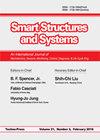Implementation of online model updating with ANN method in substructure pseudo-dynamic hybrid simulation
IF 2.2
3区 工程技术
Q2 ENGINEERING, CIVIL
引用次数: 1
Abstract
Substructure pseudo-dynamic hybrid simulation (SPDHS) is an advanced structural seismic testing method which combines physical experiment and numerical simulation. Generally, the key components which display nonlinearity first are taken as experimental substructures for actual test, and the remaining parts are modeled in simulation. Model updating techniques can be effectively applied to enhance the model precision of nonlinear numerical elements. Specifically, the constitutive model of the experimental substructure is identified online by the instantaneously-measured data, and the corresponding numerical elements with similar hysteretic behaviors are updated synchronously. Artificial neural network (ANN) can recognize the system which cannot be represented by definite numerical model, and thus avoids the structural response distortion caused by the inherent numerical model defects. In this study, a framework for online model updating in SPDHS with ANN method is expanded to implement actual test validation. Moreover, the effectiveness of ANN method is demonstrated by practical tests of a two-story frame model with bending dampers. Additionally, the unscented Kalman filter technique and offline ANN identification approach are both examined in the test validation. The experimental results show that, under the identical loading history, the online ANN method can significantly reduce the model errors and improve the accuracy of SPDHS.基于人工神经网络的子结构伪动态混合仿真模型在线更新的实现
子结构拟动力混合模拟(SPDHS)是一种将物理实验与数值模拟相结合的先进结构抗震试验方法。通常,首先表现出非线性的关键部件作为实验子结构进行实际测试,其余部件在仿真中建模。模型更新技术可以有效地应用于提高非线性数值单元的模型精度。具体来说,通过瞬时测量数据在线识别实验子结构的本构模型,并同步更新具有相似滞回特性的相应数值单元。人工神经网络(ANN)可以识别出无法用确定的数值模型表示的系统,从而避免了由于固有的数值模型缺陷而导致的结构响应失真。在本研究中,扩展了SPDHS中使用ANN方法进行在线模型更新的框架,以实现实际测试验证。此外,通过一个带有弯曲阻尼器的两层框架模型的实际试验,验证了神经网络方法的有效性。此外,无迹卡尔曼滤波技术和离线人工神经网络识别方法都在测试验证中得到了验证。实验结果表明,在相同的加载历史下,在线神经网络方法可以显著降低模型误差,提高SPDHS的精度。
本文章由计算机程序翻译,如有差异,请以英文原文为准。
求助全文
约1分钟内获得全文
求助全文
来源期刊

Smart Structures and Systems
工程技术-工程:机械
CiteScore
6.50
自引率
8.60%
发文量
0
审稿时长
9 months
期刊介绍:
An International Journal of Mechatronics, Sensors, Monitoring, Control, Diagnosis, and Management airns at providing a major publication channel for researchers in the general area of smart structures and systems. Typical subjects considered by the journal include:
Sensors/Actuators(Materials/devices/ informatics/networking)
Structural Health Monitoring and Control
Diagnosis/Prognosis
Life Cycle Engineering(planning/design/ maintenance/renewal)
and related areas.
 求助内容:
求助内容: 应助结果提醒方式:
应助结果提醒方式:


